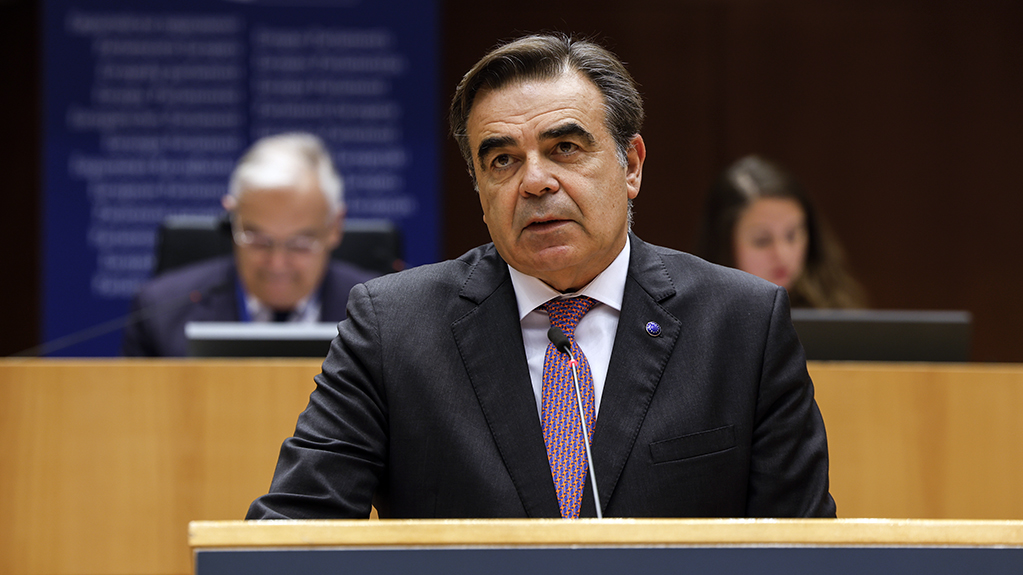At the plenary session of the European Parliament, the Vice-President of the European Commission, Margaritis Schinas, assessed the parliamentary elections in Georgia, stating that they did not meet the standards expected of a country with the status of a European Union candidate.
News
“On the 26th of October, more than 2 million Georgian citizens cast their vote to elect a new parliament. These elections were unfortunately marked by serious irregularities, with violations reported both during the electoral campaign and on the election day itself. I want to take the opportunity of this debate. First of all, to express our sincere gratitude to this house, the delegation of 7 members of the European Parliament representing the election observation mission. Your delegation provided critical insights into the climate of intimidation and pressure that marked the electoral process.
Let me state this loud and clear from the start: these elections fell short of the standards expected of a country holding EU candidate status
The ruling party benefited from an uneven level playing field, it used its substantial resources, and instrumentalism, the fear of war, positioning itself as the only political force able to ensure stability and peace. The regime also spread this information, claiming that Georgia was progressing on its EU path and suppressing descent
These tactics proved successful against the opposition who remained relatively fragmented and lacked similar resources,” said the vice president of the European Commission.
Margaritis Schinas also touched upon the many thousands of peaceful demonstrations held after the elections, where Georgian citizens "voiced their dissatisfaction with the results and the conduct of the elections."
"many of them were waving the European flag, and when we see the European flag in the hands of protesters we know that this is also about us not only about them.
After a month of these pivotal moments, I would like on behalf of the European Commission to underline 3 key points on the European response.
- Firstly, since June, the European Union has responded decisively to the democratic backsliding in Georgia. In coordination with member states, we have downgraded political contacts and suspended critical assistance. €30 million under the European facility assistance and €121 million in direct assistance to the government, Georgia's accession process has also, as a result, been halted, these measures will remain in place until the authorities change their course of action. At the same time. We'll continue our unwavering support to Georgian civil society and independent media, which remain there as it is the case with us - the fundamental pillars of democracy.
- Secondly, in the month after the election, the EU has made its position clear through strong public statements calling on the Georgian authorities to address the serious irregularities reported. My colleague, Josep Borrell has already included the issue of Georgian elections on the agenda for the next foreign affairs council next Monday, and this will provide an opportunity to discuss further steps and agree on potential additional measures.
- Finally, thirdly, any future re-engagement with the Georgian leadership will be underpinned by clear and strict conditions. Also outlined in our commission enlargement reports. The government must recommit to the reform agenda, including the implementation of the 9 steps identified by the commission. It must also seize disinformation, fake news, and anti-EU hatred and rhetoric. Specific measures are non-negotiable. The foreign influence law and the so-called family values law must be repealed. Without repealing these laws and implementing democratic reforms, It will be impossible for Georgia to progress on the accession path.
There is no alternative to Georgia's European Path. The conditions are out there and are clear - democracy and the rule of law. The sooner this is understood in Tbilisi, the better," said Margaritis Schinas.
He also noted that the Georgian people have shown a deep commitment to democratic values and the country’s progress toward EU membership for months.
"Their determination and resilience deserve our steadfast support. The Georgian people’s compass to the polls were our common European values. The same values as we saw expressed previously in Maydan, in Warsaw, in Chisinau, in Bucharest. Maybe friends of Putin do not like this but every European flag in the streets of Tbilisi, every voice raised by its protesters mirrors our model of society, our European democracy, our European foundations, our European way of life, the European rule of law, the light of hope against oppression," said Schinas.
The President of the European Commission emphasized once again that the EU’s support for the European aspirations of the people of Georgia will continue.
"The irregularities observed during the 26 October parliamentary elections are undeniable and as an EU candidate country, Georgia has to show its commitment to democracy, starting with full transparency in the election process.
The enlargement report recently adopted by the commission provides a clear pathway for the re-engagement but it clearly requires a genuine political will from Georgia’s leadership. The door of the European Union is open and we will look for the clear signs of commitments both in words and in actions," said Margaritis Schinas.















